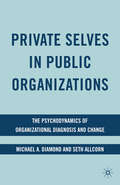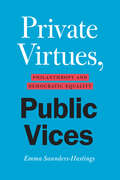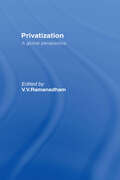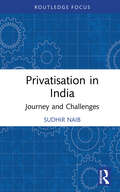- Table View
- List View
The Private Sector's Role in Disasters: Leveraging the Private Sector in Emergency Management
by Alessandra Jerolleman John J. KieferThis book examines the role of the private sector in emergency management and how that role is changing through private sector intersections with government, government agencies, and the public sectors in all phases of emergency management. It particularly focuses on the areas in which government regulations and guidelines promote or encourage priv
The Private Sector's Role in Disasters: Leveraging the Private Sector in Emergency Management
by Alessandra Jerolleman John J. KieferThis book examines the role of the private sector in emergency management and how that role is changing through private sector intersections with government, government agencies, and the public sectors in all phases of emergency management. It particularly focuses on the areas in which government regulations and guidelines promote or encourage priv
Private Security: An Introduction to Principles and Practice
by Charles P. NemethPrivate Security: An Introduction to Principles and Practice, Second Edition explains foundational security principles—defining terms and outlining the increasing scope of security in daily life—while reflecting current practices of private security as an industry and profession. The book looks at the development and history of the industry, outlines fundamental security principles, and the growing dynamic and overlap that exists between the private sector security and public safety and law enforcement—especially since the events of 9/11. Chapters focus on current practice, reflecting the technology-driven, fast-paced, global security environment. Such topics covered include security law and legal issues, risk management, physical security, human resources and personnel considerations, investigations, institutional and industry-specific security, crisis and emergency planning, computer, and information security. A running theme of this edition is highlighting—where appropriate—how security awareness, features, and applications have permeated all aspects of our modern lives. Key Features: Provides current best practices detailing the skills that professionals, in the diverse and expanding range of career options, need to succeed in the field Outlines the unique role of private sector security companies as compared to federal and state law enforcement responsibilities Includes key terms, learning objectives, end of chapter questions, Web exercises, and numerous references—throughout the book—to enhance student learning Critical infrastructure protection and terrorism concepts, increasingly of interest and relevant to the private sector, are referenced throughout the book. Threat assessment and information sharing partnerships between private security entities public sector authorities—at the state and federal levels—are highlighted. Private Security, Second Edition takes a fresh, practical approach to the private security industry’s role and impact in a dynamic, ever-changing threat landscape.
Private Security and the Investigative Process, Fourth Edition
by Charles P. NemethPrivate Security and the Investigative Process, Fourth Edition is fully updated and continues to provide complete coverage of the investigative process for private investigations by both individuals and in corporate security environments. This edition covers emerging technology, revised legal and practical considerations for conducting interviews, and new information on case evaluation. Written by a recognized expert in security, criminal justice, ethics, and the law—with over three decades of experience—the updated edition of this popular text covers concepts and techniques that can be applied to a variety of investigations including fraud, insurance, private, and criminal. It details the collection and preservation of evidence, the handling of witnesses, surveillance techniques, background investigations, and report writing. The book reflects best practices and includes tips for ensuring accurate and reliable private sector security investigations. This new edition includes: A new section on career opportunities in paths in the investigative field A rundown of the leading security Industry associations and professional standards being published Added discussion of observational interviews include current protocols analyzing data Details of the current legal implications for security surveillance and practices Advances in technology to thwart crime and fraud in retail and other business settings An entirely new section on e-records from criminal and civil judgments Authoritative, yet accessible, this book is one of the only textbooks dedicated to the subject. It also serves as an important reference for private investigators and security professionals. Complete with numerous forms, checklists, and web exercises, it provides the tools and understanding required to conduct investigations that are professional, ethical, and effective.
Private Security Law: Case Studies
by David Maxwell<P>A lot has changed since we began collaborating.<P> At the time that we launched this project, most intellectual property courses were taught along particular mode of protection lines: patent law, copyright law, trademark law, and trade secret law.
Private Selves in Public Organizations
by Michael A. Diamond Seth AllcornThis book explores organizations as not simply rational, technological structures and networks for organizing people around tasks and services; it defines organizations as relational, experiential, and perceptual systems.
Private Spaceflight: A Case Study of Iconoclasts Working Together
by Gregory BernsPutting ordinary citizens into space strikes most people as crazy. Space is a frontier that the vast majority of humanity currently has no access to, no interest in, and wonders why anyone should spend exorbitant sums of money to travel to. To even consider such a venture flies in the face of conventional wisdom, which is why the privatization of spaceflight represents a unique case study in iconoclasm. The key players are all people who exemplify the three characteristics of iconoclastic thinkers: they see differently, deal with fear, and have high levels of social intelligence.
The Private Sport Sector in Europe
by Antti Laine Hanna VehmasThis book outlines the private sport sector in different European countries. Sport in the European countries is organized in three distinct sectors. These are the state/public sector, which provides financial and political support for sport infrastructure; the civic/non-profit sector, which provides sport activities and services for citizens, usually in the forms of sport clubs; and the private sector, which is comprised of profit-making private companies and professional teams that produce and sell sport products and services. The private sport sector is becoming ever more important in a global market economy and a financial climate characterized by a public sector in crisis. Taking this into consideration, this book provides a detailed outline of the structure and characteristics of the private sport sector, discusses recent developments in the sector, and compares data across business fields and countries. Containing contributions from sport academics from eighteen countries, this book provides an overall, up-to-date picture of the private sport sector in Europe. Filling a significant gap in sport sociology and economics scholarships, this book will be of use to students and scholars of business and social sciences of sport as well as decision makers and the entrepreneurs.
Private Truths, Public Lies: The Social Consequences Of Preference Falsification
by Timur KuranDrawing on diverse intellectual traditions, including those rooted in economics, psychology, sociology, and political science, Kuran provides a unified theory of how preference falsification shapes collective decisions, orients structural change, sustains social stability, distorts human knowledge, and conceals political possibilities.
Private Virtues, Public Vices: Philanthropy and Democratic Equality
by Emma Saunders-HastingsA thought-provoking challenge to our ideas about philanthropy, marking it as a deeply political activity that allows the wealthy to dictate more than we think. Philanthropy plays a huge role in supporting the provision of many public goods in contemporary societies. As a result, decisions that affect public outcomes and people’s diverse interests are often dependent on the preferences and judgments of the rich. Political theorist Emma Saunders-Hastings argues that philanthropy is a deeply political activity. She asks readers to look at how the power wielded by philanthropy impacts democracy and deepens political inequality by enabling the wealthy to exercise outsize influence in public life and by putting in place paternalistic relationships between donors and their intended beneficiaries. If philanthropy is to be made compatible with a democratic society of equals, it must be judged not simply on the benefits it brings but on its wider political consequences. Timely and thought-provoking, Private Virtues, Public Vices will challenge readers’ thoughts on what philanthropy is and how it truly affects us.
Private Voluntary Health Insurance
by Greg Brunner Birgit Hansl Vijayasekar Kalavakonda Nicole Tapay Pablo Gottret Somil NagpalHealth insurance can offer protection against catastrophic medical expenses and improve access to health care. There are, however, imperfections in the insurance market that require intervention such as asymmetry of information between the policy holder and the insurance company, moral hazard that can occur on the side of the insured or the provider of health services, risk selection that may lead to cream skim a particular market, and others. To encourage the effective development of Voluntary Private Health Insurance, it will be necessary for policymakers to establish and enforce regulatory standards that will attempt to correct inefficiencies from market failures and that will achieve desired social objectives. This book is intended to help countries that are contemplating how to design and implement a legal framework for a private health insurance market. First, it provides an overview of private health insurance, the rationale for insurance regulation, and the institutions involved in administering insurance laws. It then reviews the key standards and protections that are often used in regulating private health insurance. As part of the discussion on regulatory standards, options for supervisors in certain areas where policy and regulation approaches vary will be noted. To illustrate international experience, examples of the regulation of private health insurance from several low, middle, and high-income countries will be drawn upon throughout the book.
Private Wealth
by Horan Stephen M.An in-depth examination of today's most important wealth management issues Managing the assets of high-net-worth individuals has become a core business specialty for investment and financial advisors worldwide. Keeping abreast of the latest research in this field is paramount. That's why Private Wealth, the inaugural offering in the CFA Institute Investment Perspectives series has been created. As a sister series to the globally successful CFA Institute Investment Series, CFA Institute and John Wiley are proud to offer this new collection. Private Wealth presents the latest information on lifecycle modeling, asset allocation, investment management for taxable private investors, and much more. Researched and written by leading academics and practitioners, including Roger Ibbotson of Yale University and Zvi Bodie of Boston University, this volume covers human capital and mortality risk in life cycle stages and proposes a life-cycle model for life transitions. It also addresses complex tax matters and provides details on customizing investment theory applications to the taxable investor. Finally, this reliable resource analyzes the use of tax-deferred investment accounts as a means for wealth accumulation and presents a useful framework for various tax environments.
Private Wealth and Public Revenue in Latin America
by Tasha FairfieldHow and when can democracies tax economic elites? This book develops a theoretical framework that refines and integrates the classic concepts of business's instrumental (political) power and structural (investment) power to explain the scope and fate of tax initiatives targeting economic elites in Latin America after economic liberalization. In Chile, business's multiple sources of instrumental power, including cohesion and ties to right parties, kept substantial tax increases off the agenda. In Argentina, weaker business power facilitated significant reform, although specific sectors, including finance and agriculture, occasionally had instrumental and/or structural power to defend their interests. In Bolivia, popular mobilization occasionally counterbalanced the power of economic elites, who were much stronger than in Argentina but weaker than in Chile. The book's in-depth, medium-N case analysis and close attention to policy-making processes contribute insights on business power and prospects for redistribution in unequal democracies.
The Privateers: How Billionaires Created a Culture War and Sold School Vouchers
by Josh CowenA deep-dive investigation of education privatization that reveals voucher programs as the faulty products of decades of work by wealthy patrons and influential conservatives
Privatisation: A Global Perspective (Routledge Library Editions: Public Enterprise And Privatization Ser.)
by V. V. RamanadhamFirst published in 1993. Routledge is an imprint of Taylor & Francis, an informa company.
Privatisation and Development: Theory, Policy and Evidence
by Claude V. ChangThe book interrogates privatisation in terms of its effectiveness vis-à-vis its stated goals and more fundamentally in terms of its success in delivering economic development. It investigates why privatisation was successful in the UK and other OECD countries and why it has not met with equal success in developing countries. In this regard, it further examines the policy prescriptions of the IMF and World Bank in relation to the conceptualised benefits and theoretical assumptions underlying these supposed benefits. The author assesses the extent to which culture and customs, indeed the mode of production, stand in determinate relationship to the goals, techniques and outcome of the process. Furthermore, Chang examines the degree to which socioeconomic and moral consequences of privatisation have been ignored in pursuit of the ideological imperative implicit in the Washington Consensus. Hence, the book contributes to the reflective thought that must necessarily be part of theory validation, and provides the basis for a balanced and empirically-valid theory of privatisation.
Privatisation and Financial Collapse in the Nuclear Industry: The Origins and Causes of the British Energy Crisis of 2002 (Routledge Studies In Business Organizations And Networks Ser. #Vol. 43)
by Simon TaylorA timely contribution and incisive analysis, this is the story of the British experiment in privatizing the nuclear power industry and its subsequent financial collapse. It tells how the UK's pioneering role in nuclear power led to bad technology choices, a badly flawed restructuring of the electricity industry and the end of government support for
Privatisation and Liberalisation in European Telecommunications: Comparing Britain, the Netherlands and France (Routledge Studies in International Business and the World Economy)
by Willem HulsinkThis book combines a detailed, sector-specific study of comparative telecommunications regimes set in the context of the EC, with an extensive historical and empirical analysis of individual policy management and change as experienced by three diverse regulatory cultures, namely, Britain, the Netherlands and France. By adopting a comprehensive analytical framework based on far-reaching literature, the author explores a wide-range of theories, addressing key issues at the forefront of contemporary political and academic debate as: Do nation states matter in the globalizing telecommunications industry? Does the common challenge of techno-global telecommunications restructuring elicit different national responses? What is the significance of a single-speed or multi-speed Europe in implementing telecommunications governance regimes?
Privatisation in Developing Countries (Routledge Library Editions: Public Enterprise and Privatization)
by V. V. RamanadhamIt is widely felt that the public sector in many developing countries is too large, and that privatisation would benefit both the users of individual services and the economy in general. However, enthusiasm for private enterprise solutions is not always matched by the requisite financial and economic technology. The sort of schemes appropriate for a country like China, with its highly planned public sector economy, and Jordan, with its dominant private sector, are unlikely to be the same. Privatisation without reference to these differences will be an economic, administrative and organisational chaos rather than a panacea. Originally published in 1989, this book starts with an analysis on the concept, rationale and fundamental issues of privatisation, with reference to both developed and developing countries. There follows a critical scrutiny of the privatisation programmes of countries in Asia, Africa and Latin America, written by contributors actively concerned with public enterprise and privatisation at the time. It examines the role of international aid agencies, including the World Bank, in promoting the schemes and it details the positive impact of them as well as their pitfalls. These country accounts are complemented by a concluding chapter giving an overview of the substantial issues raised.
Privatisation in India: Journey and Challenges (Routledge Focus on Business and Management)
by Sudhir NaibThis book is a comprehensive work which incisively analyses, from a theoretically informed perspective, crucial aspects of India’s journey from partial divestiture to privatisation, accompanied by case studies of enterprises being privatised in FY 2022. Naib begins with the economic role of the state followed by theoretical and empirical evidence on the state versus private ownership in the first two chapters. Next, an overview of public sector in India including the New Public Sector Enterprise Policy for Atmanirbhar Bharat-2021 is discussed, before a broader examination of the global experience with privatisation is done. Naib then goes on to explore India’s journey from partial divestiture to privatisation from 1991 to 2021 in four time slots based on the political party in power. The book also looks at big ticket privatisation and asset monetisation proposed in FY 2022. Many criticised the design of National Monetisation Plan as it may lead to concentration of wealth, increasing inequalities, asset stripping, and consumers paying higher charges. The book closes by presenting six instances of big-ticket privatisations ranging from airlines, airports, banks, insurance, as well as industries such as petroleum and telecoms. The book’s timely data and analysis of key developments will interest researchers in the fields of divestiture and privatisation in India.
Privatisation in India: Challenging economic orthodoxy (India in the Modern World)
by T.T. Ram MohanOver the past decade India has been undertaking a programme of economic reform, and at the same time the economy has been growing at a high rate. As part of the reform programme, and in line with prevailing economic thinking, India has been privatising its large, ungainly public sector. One assumption underlying this programme is the dogma that public sector enterprises are doomed to inefficiency, and that competitive market forces can be relied on to make firms more efficient once they are privatised. But is this really true? Combining rigorous data analysis with case studies to provide a balanced evaluation of the process of deregulation and privatisation within the overall context of economic reforms, the author demonstrates, remarkably, that, contrary to the prevailing view, private sector firms do not outperform public sector firms across all sectors. He also shows that revenue-raising considerations have weighed more heavily with the government than efficiency objectives. Overall, this study of the reform process in India, with its unique longstanding mix of private and public sectors, will be of great interest to all those studying reform and transition worldwide.
Privatisation in Ireland
by D�nal Palcic Eoin ReevesThis book analyzes privatization in Ireland, a European economy that has experienced rapidly changing fortunes over the last thirty years. It examines the effects of privatization in terms of corporate performance, public finances and the distributional aspects of privatization including the impact on employment and share ownership.
Privatisation in the UK (Routledge Library Editions: Public Enterprise and Privatization)
by V. V. RamanadhamThe Conservative’s privatisation programme was one of the most ambitious aspects of their attempt to redraft the political and economic map of the United Kingdom. Originally published in 1988, this book explores the processes of privatisation from a variety of standpoints. Its contributors include academics, enterprise executives and government officials, many of whom had been closely involved in the programme. Fiscal, legal and social aspects of privatisation are explored but the book treats the subject as more than an immediate political issue and takes the opportunity to discuss the success – or otherwise – of public enterprise and to explore the implication of the UK experience for other countries which have an interest in privatisation.
The Privatisation of British Rail: How Not to Run a Railway (Routledge Studies in Accounting)
by Sean McCartney John StittleThe privatisation of the British railway industry was a unique political and economic event. An integrated industry was broken-up into numerous component parts and sold off to private sector interests. The result was a highly fragmented industry that was structurally unsound and operationally dysfunctional. This authoritative volume presents an enlightening portrait of an industry that is less efficient, more costly and still more dependent on state subsidy today than its nationalised predecessor. The nine chapters in this work present a comprehensive and rigorous evaluation of how and why the industry has become so dysfunctional and costly, supported by detailed financial analysis and industry examples. Seven chapters comprise a series of peer-reviewed academic papers by Professor McCartney and Dr Stittle and published in leading international journals over the period 2004–2017 which analyse selected key segments of the privatised industry: where appropriate, updates are provided at the end of these chapters outlining developments since initial publication relevant to the analysis therein. Two chapters are published here for the first time: Chapter 7 reviews the performance of the freight sector, while Chapter 1 ‘bookends’ the volume by providing first, an account of how rail privatisation was conceived and implemented in the 1980s/90s, and then reviews the impact of the pandemic and the proposals of the Williams-Shapps White Paper of 2021 which, if enacted, will effectively end the Major government’s experiment. Going far beyond the usual superficial analysis of the topic, this volume will be of significant interest to researchers and advanced students of accounting, economics, business history, transport studies, as well as industry and specialised business interests in transport and privatisation.
The Privatisation of European Telecommunications
by Johan FromThis international volume presents a comprehensive, comparative study of the transformation of the European telecommunications industry from 1990 to the present. The book focuses on the old incumbent operators and their dramatic change from state agencies to listed companies. It analyzes the liberalization process, as well as the corporatization and privatization of these companies. The contributors assess the conditions for the transformations taking place; the driving forces for change; the effects to management, the efforts of the EU during these processes, and ultimately, the role of the private owner. Political science publications have all but excluded analysis of the newly privatized companies; their contribution to the liberalization process both before and after privatization; and the interplay between the national political and company levels. The book redresses this shortcoming, and also features a double empirical focus in that the main national incumbents in Europe are analyzed and compared to Telenor, the Norwegian former incumbent.





















